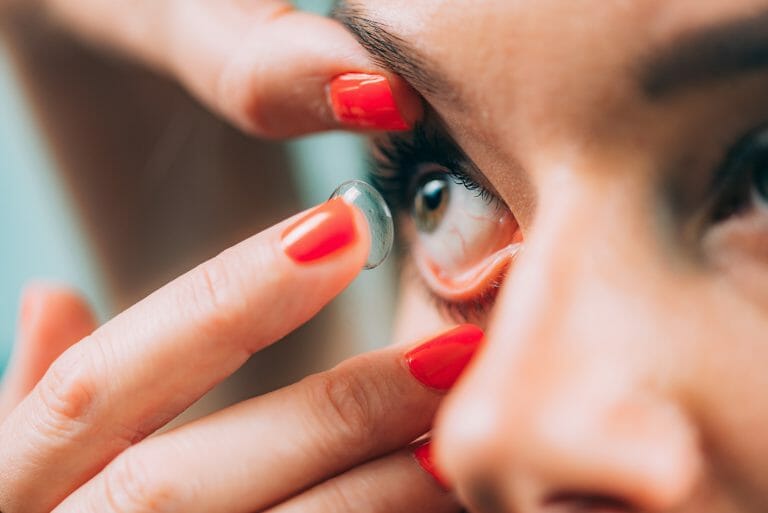Contacts are worn by more than 135 million people across the world. Such a huge population uses them due to the comfortable vision correction and precision they offer. Contact lenses offer low-maintenance, natural-looking control of the vision of both adults and young people. Some individuals suffering from visual defects use glasses to counter them. Contact Lenses are improved early to make them more economical, functional, and practical for people.
Whether you are shopping for removable contact lenses to wear during sports activities or switching to a pair for the improved corrective prescription, fresh, new contacts can bring a big change in your ability to see.
Similar to any other change, eyewear change also requires an adjustment period. And switching to contact lenses is very daunting for many. Wearing contacts for the first time is hard on the eyes of many patients. Everyone needs some time to get used to contacts. The change is very challenging for those who have never worn contact lenses ever before. Before patients leave the eye doctor’s clinic, he/she will give them some instructions for care and use of the new lenses. As far as time duration is concerned, it can take as long as 12 days to properly getting used to your new contacts. But for some new contact lens wearers, the adjustment period may extend more than that. You can stand in front of a mirror and take your time to wear or adjust lenses on your eyes. There are some side effects during the adjustment period which you need to take care of.
Normal Side Effects
It may take some time to get used to wearing lenses as it appears weird to place a foreign object on your eye’s surface. Once major symptoms are seen, you need to get an appointment with your eye doctor, get your eyes examined, and have a prescription for your eyes. You may face some vision issues such as:
- Blurred Vision
 New contact lens wearers may feel a little bit of blurriness. The distortion is normally because of eye dryness. You can meet your optometrist or eye doctor to ask for medication eye drops or anti-dry-eye drops to counter your dryness or moisture loss. Make sure not to ride a bike or drive a car if you feel blurry. You can travel but make sure to remove your contact lens and use glasses to decrease the chances of an accident.
New contact lens wearers may feel a little bit of blurriness. The distortion is normally because of eye dryness. You can meet your optometrist or eye doctor to ask for medication eye drops or anti-dry-eye drops to counter your dryness or moisture loss. Make sure not to ride a bike or drive a car if you feel blurry. You can travel but make sure to remove your contact lens and use glasses to decrease the chances of an accident.
- Discomfort
 While adjusting to your new lens, you may blink more often than usual or find tears coming out.After a few uses, you will get used to wearing them and feel more comfortable wearing them. And hence, this discomfort ability will also disappear with continuous usage. If you don’t feel comfortable inserting them, remove them, apply some more water on them and then wear them. This will alleviate slight discomfort.
While adjusting to your new lens, you may blink more often than usual or find tears coming out.After a few uses, you will get used to wearing them and feel more comfortable wearing them. And hence, this discomfort ability will also disappear with continuous usage. If you don’t feel comfortable inserting them, remove them, apply some more water on them and then wear them. This will alleviate slight discomfort.
- Eye Fatigue
You may feel tired after wearing contacts for some time. To treat and prevent this troublesome eye fatigue, shorten the wearing time of your lens. Then gradually, you can increase the duration of wearing contact lenses. In this way, you will find comfort in getting used to using contact lenses. You can also apply the wetting solution or lens drops as per your requirement.
Be mindful of the manufacturer’s instructions such as:
- Disposal date
- Wearing Time
- Complete cleaning and storage
- Either lens can be worn overnight or not
Unusual Side Effects
The most disturbing side effects of contacts are due to a problem with the contact lenses themselves or the wrong way of use. The wrong use can include:
- Keeping lenses in faulty conditions
- Cleaning contacts with the wrong solution or a contact lens solution not made for those specific contacts
- Wearing lenses past their expiry date, excessive use or using for more hours than defined
- Wearing or removing your contacts with dirty hands
These harmful side effects can also cause by incorrect contact type, brand, or lens faults. These unusual side effects are as follows:
- Eyes Strain
Different individuals feel different eye strain, but is felt or diagnosed by the symptoms as follows:
- Light sensitivity

- Burning sensation
- Double vision
- Neck, shoulder, and back pain
- Headaches
Normally, eye strain symbolizes a problem with the length of wear or kind of contact. Remove your contacts to give your eyes some rest if you feel extreme eye strain. You may refer to an eye doctor to evaluate the contacts and examine the way you use them.
- Infection
Eye infections can result in visual disturbances, irritation, or discoloration. In most cases, due to misuse, contact lens sufferers are affected by contract infections. To avoid infection, follow these guidelines:
- Keep your lens clean
- Don’t apply eye makeup while adjusting to your new contact lenses
- Store the lens as per the company guidelines
- Don’t use a hot tub or swim while using contacts
If you get a feeling or eye infection, immediately stop wearing contacts and visit your eye doctor for the proper treatment. You can ask questions to your optometrists regarding your eye infection.
- Prolonged Irritation
As told earlier, some small irritation for a short time is nothing to worry about. But, if you continue to feel discomfort for a week or two, it is a sign that there is some issue with the eye condition or with the contacts. Stop wearing your contact lenses or any type of contact lenses and schedule a meeting or appointment for examination by your doctor. Contacts do provide clear crisp vision correction to most wearers. Most likely, you will not feel long-term discomfort or sight problems after being adjusted to your soft lenses. A lot of initial issues are eliminated as you continue to care and wear the contacts. During the adjustment time, observe any irregular side effects and report them to your eye practitioner. You can enjoy accurate sight adjustment contacts with proper attentiveness and care.
Are Contact Lenses Hard To Look After?
It’s true that it may take some days for the eyes to adjust to wearing your contacts. If you are still wondering how long it can take to get used to looking and maintaining them, you will get surprised knowing that. If you are concerned about daily contacts, you don’t need any major maintenance and look after. You only wear and throw them away after you have finished using them.
Whereas, two weeks and monthly contact lenses demand proper care for improving your eye health. Contact lens maintenance and hygiene are required for storing your contacts in the right condition. You may take some time on learning how to store and clean your new contacts, but with time, you will become habitual of it. But ensure that you ask your optometrist for guidelines on how to maintain, care and store your glasses or lenses in the right way. The process of adjustment with their pair of contact lenses is difficult for some individuals. But it is easy for the ones who are used to wearing them.


